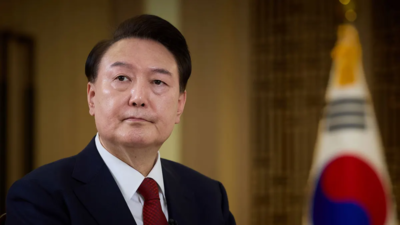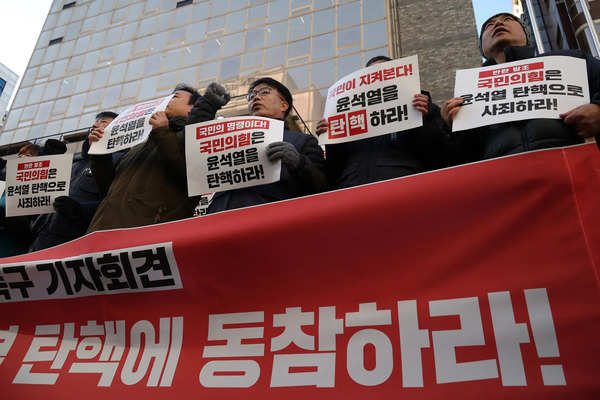
South Korean President Yoon Suk Yeol‘s attempt to declare martial law this week on Tuesday resulted in an impeachment motion against him which, in turn, failed miserably on Saturday. The motion, which came just days after Yoon’s controversial declaration, did not gather enough votes, and his ruling party’s members boycotted the vote, preventing it from passing.
The vote was seen as a significant moment in South Korea’s political crisis, one of the worst the country has faced in decades. The crisis threatened the country’s reputation as a stable democracy, and the decision to halt the impeachment vote came after mounting domestic and international pressure.
Despite the uproar, Yoon survived his impeachment, unlike former President Park Geun-hye, whose own impeachment came after a massive corruption scandal in 2016. The differences between the two events highlight the shifting dynamics in South Korean politics.
What led to Yoon surviving his impeachment
On Saturday, National Assembly Speaker Woo Won-shik declared the impeachment motion invalid, explaining that it failed to meet the necessary quorum of a two-thirds majority of the National Assembly. The vote only reached 195 votes, far below the required threshold. Woo referred to the outcome as “very regrettable,” criticizing the failure to carry out a qualified vote on such a critical issue. He also expressed concern over the embarrassment it caused to the country’s democratic processes.
“The failure to hold a qualified vote on this matter means we were not even able to exercise the democratic procedure of deciding on a critical national issue,” Woo said, emphasizing the severity of the situation.
Yoon’s survival of the impeachment motion is largely attributed to his ruling People Power Party (PPP), which successfully boycotted the vote to ensure that the motion did not pass. Unlike Park’s impeachment, which saw significant support within her ruling party, Yoon’s case has been marked by a unified defense from his party. This is seen as a result of political maneuvering, where the ruling party feared further division and electoral defeat if Yoon were to be removed from office.
Why was former president Park Geun-hye’s 2016 corruption scandal so damaging?
In contrast, Park Geun-hye’s impeachment in 2016 was a product of a corruption scandal that captivated South Korea and led to widespread protests. Park was accused of colluding with her close friend Choi Soon-sil, who used her influence to extort money from companies and to pressure government officials.
The scandal led to Park’s impeachment, with even members of her own Saenuri Party supporting her removal. The political fallout from Park’s scandal was swift and severe, leading to the collapse of her party.
The Saenuri Party fractured following Park’s impeachment, with the anti-Park faction breaking away to form the Bareun Party, while the remaining conservatives rebranded as the Liberty Korea Party. This split left the conservative camp vulnerable in the 2017 snap election, which resulted in the liberal Democratic Party of Korea (DPK) candidate Moon Jae-in winning the presidency.
The loss of political ground following Park’s impeachment led to the conservative bloc struggling for years to regain public trust. The PPP, the current ruling party, was formed through a merger of the Liberty Korea Party and Bareun Party. However, even after merging, the conservatives still found it difficult to win back support from voters, securing only one-third of the seats in the National Assembly in the 2020 general elections.
Many of the conservative politicians associated with Park’s administration faced investigations or were forced to retire due to their involvement in the corruption scandal. Some struggled to gain political candidacy, losing elections even when they did manage to secure a nomination. These political and legal challenges forced Yoon to bring in figures from the previous Lee Myung-bak administration—Park’s predecessor—into his government to help stabilize his position.

The fear of electoral annihilation
The main reason Yoon survived his impeachment, while Park did not, lies in the ruling party’s fear of electoral “annihilation.” When Park was impeached, her party, the Saenuri Party, lost the trust of the public and collapsed. Many within the PPP fear that a similar outcome would occur if Yoon were impeached. The ruling party worries that the opposition, led by Democratic Party of Korea (DPK) leader Lee Jae-myung, would likely seize power in a snap election following Yoon’s removal.
Furthermore, PPP lawmakers fear that the removal of Yoon could lead to a complete electoral collapse, with many losing their parliamentary seats in the next general election. This fear has contributed to the strong resistance to impeachment within the ruling party.
Rep. Kim Gi-hyeon, a pro-Yoon lawmaker, stressed the lasting political damage Park’s impeachment caused, stating that the party suffered from national division and lost all credibility. “If we again impeach a president whom we selected, we’ll never be able to ask the people to elect us (conservatives) next time,” he wrote on Facebook.
As a result, despite the political crisis triggered by Yoon’s martial law declaration, the ruling party has chosen to rally behind him, avoiding the fate of Park Geun-hye and keeping its grip on power, at least for now.






